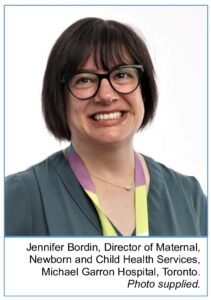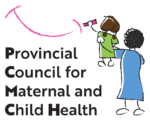In March 2023, PCMCH released the Providing Inclusive, Affirming and Safer Perinatal Care to 2SLGBTQIA+ Individuals tip sheet, a resource that supports perinatal healthcare providers, teams and organizations in advancing high-quality care for 2SLGBTQIA+ parents and families throughout the pregnancy, birthing and postpartum periods. As the tip sheet promotes, efforts to provide inclusive, affirming and safer perinatal care must be continuous and action-oriented. Jennifer Bordin, Director of Maternal, Newborn and Child Health Services at Michael Garron Hospital in Toronto, sat down with PCMCH to discuss her perspectives on how her program and organization are approaching 2SLGBTQIA+ inclusivity in perinatal care.
A Healthcare Leader’s Perspective in Ontario
Bordin has been a strong ally of the 2SLGBTQIA+ community throughout her career. Her commitment to this work was sparked when she learned of a negative  birthing experience from a patient who provided feedback. Upon reflection, Bordin was moved to explore what could be done to prevent other individuals from experiencing this harm in the future. She realized this was an area she needed further education on. She also contemplated how the patient’s care experience could have been made more positive if their healthcare team was equipped with more comprehensive knowledge of how to meet the care needs of 2SLGBTQIA+ families in a culturally safe manner. “I want the units and organizations I work in to be a safe place for everyone – whether you’re a member of the 2SLGBTQIA+ community, or another marginalized group – and regardless of the colour of your skin, your beliefs, or your religion. I want all patients to feel comfortable, respected and welcomed,” Bordin said. “This motivates me to stay up-to-date and educated on research and best practices, and to see everything through with an equity, diversity, inclusion and belonging lens.”
birthing experience from a patient who provided feedback. Upon reflection, Bordin was moved to explore what could be done to prevent other individuals from experiencing this harm in the future. She realized this was an area she needed further education on. She also contemplated how the patient’s care experience could have been made more positive if their healthcare team was equipped with more comprehensive knowledge of how to meet the care needs of 2SLGBTQIA+ families in a culturally safe manner. “I want the units and organizations I work in to be a safe place for everyone – whether you’re a member of the 2SLGBTQIA+ community, or another marginalized group – and regardless of the colour of your skin, your beliefs, or your religion. I want all patients to feel comfortable, respected and welcomed,” Bordin said. “This motivates me to stay up-to-date and educated on research and best practices, and to see everything through with an equity, diversity, inclusion and belonging lens.”
Healthcare experiences of those who identify as 2SLGBTQIA+ are variable: they may experience invisibility or exceptionality. In other words, they may be ignored and made to feel less than, or they may be treated as different and as though they do not belong. Both are exclusionary, and neither are acceptable in our healthcare system.
Bordin has observed that when healthcare providers are uninformed of the needs of 2SLGBTQIA+ families and how to meet them, these families experience more barriers as they attempt to access care. “All it takes is for one person to make an assumption, or say the wrong thing, and it can ruin their whole experience,” Bordin recounted. 2SLGBTQIA+ individuals may be at higher risk of discrimination in a healthcare context that can lead to traumatic care experiences and subsequently may discourage them from seeking healthcare in the future.
Taking Actionable Steps
From Bordin’s perspective, there has been a generational shift in which those providers who obtained their education more recently are increasingly aware of, and comfortable with, providing inclusive care to members of the 2SLGBTQIA+ community. Those who completed their education when 2SLGBTQIA+ inclusivity was not commonly taught, and curriculum was predominantly developed and taught through a cisnormative and heteronormative lens, may need further support to overcome harmful patterns of biased thinking and influence behaviour change. Each and every provider must continuously challenge their personal biases, commit to ongoing learning/unlearning and take accountability for their actions, while organizational and leadership support must be present for this to be done in a meaningful and sustainable way.
Bordin shared that equity, diversity and inclusion learning opportunities are frequently promoted throughout MGH for all staff, and that discussing patient and family feedback is a central component of staff’s performance reviews within her portfolio. Fostering safer care environments for 2SLGBTQIA+ families goes beyond the technical components of inclusive language; it also includes appropriately responding to each person’s unique preferences and care needs and oftentimes involves co-developing a care plan that is tailored to optimize a patient’s healthcare experiences and outcomes.
In order to engage in action-oriented allyship on a larger scale with 2SLGBTQIA+ individuals and families accessing perinatal healthcare at MGH now and in the future, Bordin and her team identified gaps within the perinatal care areas that she oversees. This occurred after a multidisciplinary committee in the Maternal, Newborn and Child Services Department was established. The committee, largely composed of staff who identify across the 2SLGBTQIA+ spectrum, receives and analyzes feedback from patients, staff and external organizations. They then liaise with those who submitted feedback to ensure that the appropriate solutions are implemented. The feedback and subsequent solutions range from provider-focused practices to institutional-level policies – for instance:
- conceptualizing next of kin in an inclusive manner;
- utilizing green birth cards as opposed to pink or blue birth cards;
- adding chest feeding into the pre-existing breastfeeding policy; and
- ensuring that prenatal class content is welcoming of all families.
Establishing a Novel Partnership
A significant component of the equity and inclusivity work occurring within MGH is their partnership with the 519 and their offering of a workshop to all staff. The 519 is a Toronto-based organization that provides organizations with the insights, tools and understanding to create environments that are 2SLGBTQ+ inclusive, respectful and welcoming. Carol Soares, Equity, Diversity and Inclusion Specialist at MGH, explained that the training supports staff in developing an understanding of the history and needs of the 2SLGBTQIA+ community, as well as their experiences within a healthcare space such as MGH. The training is instructor-led and offered on a bimonthly basis.
Continuous Reflection and Commitment to Improve
Despite the strides that Bordin, her team and the hospital have made, she recounted that MGH is at the early stages of its journey and that there is still progress to be made. Similarly, PCMCH, recognizes there is much more to be done internally as an organization and externally in the perinatal and child health sectors to remove barriers, advance equity and inclusion, and celebrate diversity. We can all draw knowledge and inspiration from Bordin and her team as we commit to knowing and doing better. As Bordin concluded, “we want people to feel safe, listened to and respected when they are receiving care at MGH.”
